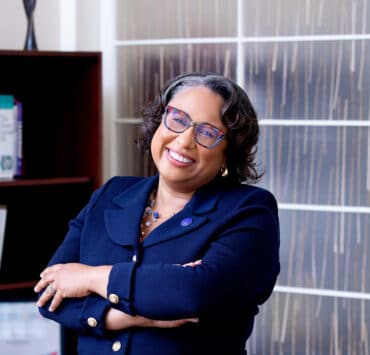In high school there was a teacher who really believed in me. I would see him and turn the other direction to avoid him because he kept encouraging me to be in clubs and activities. He said I was a leader. But I disagreed.
Just a year prior to meeting him I had been paralyzed in a car accident and now used a wheelchair for mobility. Newly disabled and about to start high school, the last thing I wanted to be was a leader. I didn’t want to call attention to myself and hoped to disappear into a sea of other teenagers. But as much as I tried to ignore it, his voice stuck in my head, and I eventually joined the clubs all while pretending it was not cool.
I learned to be an advocate for myself very early on—in school, the community, college, work, travel . . . everywhere. I was lucky to have had some incredible opportunities that gave me the confidence to pursue my goals as I grew into a disabled adult. I fully recognize that these opportunities and support such as internships, mentoring, residencies, and study abroad programs all contributed and led me to leadership roles.
Sometimes all it took was for somebody to tell me that I would be good at something and believe in my potential. This inspired me to mentor others and share what I knew. Because others helped me, I wanted to ensure that I was creating and opening up opportunities for newly disabled individuals looking to find a path and live a life that fulfills them.
Corporations, organizations, and even community organizers are leading impactful initiatives without realizing that they have excluded a large segment of our population that intersects with every identity.
Reveca Torres
Imagining A Future
I didn’t know much about starting a nonprofit or how to manage one; my background was in fashion and theater. Still, I saw a need, had an idea, and put it into motion. In 2009 I incorporated BACKBONES and it became a 501c3 nonprofit organization serving people with spinal cord injury and paralysis.
I wanted this organization to be positive and motivate people to pursue their goals and the quality of life that they desire. I imagined a future where I could employ people with disabilities and that our board of directors included a majority of people with disabilities, in addition to family members or health professionals that work with people with disabilities.
These possibilities began to take shape: I was asked to lead workshops about disability or accessibility. While I love talking about these topics I was burnt out and exhausted! I thought, there are hundreds of other people with disabilities that are unique and interesting and have a valuable perspective on the same topics. Wouldn’t it be better if there were more of us talking and reaching different audiences?!?
The opportunity to speak in front of people or to participate in fellowships or think tanks gave me confidence to voice my opinion. I was ready to pass this forward. How could I support and elevate the voices of others in my community?
In 2020 our team developed a Leaders Program that brought together ten individuals with spinal cord injury (SCI) to participate in a year-long program where they develop skills to become leaders in their own communities. They learn from their peers and disabled leaders, network, and have access to professional development grants. We are now in our fourth year, and it is amazing to witness program alumni arrive at leadership in a variety of ways such as policy making, starting a podcast, writing a book, launching a business, starting a nonprofit, producing a documentary, etc.
Investing in disabled leaders is having a trickle effect as they continue to impact their communities and are bringing an intersectional lens to their work. In the disability community there is a wealth of knowledge, and innovative ideas, yet there are structural barriers and a lack of opportunities, resources, and access to knowledge. What happens when we think creatively and focus on ability rather than limitation?
I imagined a future where I could employ people with disabilities and that our board of directors included a majority of people with disabilities, in addition to family members or health professionals that work with people with disabilities.
Reveca Torres
COVID-19: A Challenge and a Blessing
As the COVID-19 pandemic quickly took over the globe, the world pivoted to virtual platforms and everyone experienced isolation. The pandemic revealed many challenges and inequalities for the disability community. People were getting sick and dying, others struggled to find and keep caregivers, lost jobs, and many continue to be fearful of the virus because of compromised immune systems.
At the same time, we were strong; the disability community was prepared and equipped to handle isolation and provide mutual care to those in our community. We knew how to problem-solve and adapt. More virtual spaces meant access to programs and remote employment that were generally denied to our community. There was now a sense of “leveling of the playing field.”
There have been more conversations about diversity and inclusion but at the same time I am disheartened that often disability is left out of the conversation. Corporations, organizations, and even community organizers are leading impactful initiatives without realizing that they have excluded a large segment of our population that intersects with every identity. In my experience through these past few years, I have seen more grants and programs supporting elevating the voices of underrepresented communities.
I am a disabled Mexican American woman, and had these programs or opportunities not encouraged underrepresented applicants, I may have not had the confidence to even apply. I felt these spaces were ready and open to welcome me, embrace my work, and think with an equitable lens. Being a woman of color has helped me access spaces that are still excluding people with disabilities and has helped me broaden the definition of diversity and inclusion.
Ways to Invest in Disabled Leaders
- Resources: Create new programs if none exist. Think about what else can be done with the ones that do exist.
- Development: Help people with professional development such as programs, grants, scholarships, and mentorships. Introduce networking spaces and opportunities.
- Equitable employment: Consider the barriers to employment when designing job positions and factor in things like workplace accommodations, flexibility, and benefits.
- Value: Compensate people for their time, stories, and experience. This includes staff, interns, guest speakers, volunteers, etc. and is not always monetary.
- Ask, Don’t Assume: Ask what the community wants and provide spaces to listen and take feedback.
- Ensure: Build a pipeline for leadership and success that is equitable and inclusive.
Investing in Leaders
Although I face many barriers particularly in spaces that have historically excluded women, the disabled, and people of color, I also possess power and privilege. I am lucky to be in a position to create or open up opportunities for others as the executive director of a nonprofit, an artist, and a filmmaker.
I want to see representation of disability in leadership roles including keynote speakers, organizational consultants, committee chairs, CEOs, advisory boards, and more. Leaders with disabilities can fill these roles and offer a different perspective and lens.
In our Leaders Program we ask participants to think about their power and privilege and in what ways they can create spaces and opportunities for the disability community. We ask, “How can you make change in your communities? How can you change structures and systems to be more equitable and accessible to people of all abilities?”
I invite you to take action and to invest in disabled leaders. What you will find is that our collective communities will be gifted with new perspectives and will become richer and more vibrant.
Reveca Torres is an artist and founder and executive director of BACKBONES, an organization helping people with spinal cord injury and disabilities. She is codirector of ReelAbilities Film Festival Chicago and has curated touring photography and art exhibitions that showcase the work of people with disabilities and bring awareness to disability rights. Reveca received Creative Access Fellowships at Vermont Studio Center (2014) and Santa Fe Art Institute (2017).
She was selected as a fellow for Kartemquin Films Diverse Voices in Docs program (2017) and Hulu+Kartemquin Accelerator Program (2020). She received a 3Arts Residency Fellowship at the University of Illinois Chicago in 2018 and is one of 2020 3Arts Awardees and 2022 Next Level Awardee.
In 2020 Reveca was one of four fellows for International Documentary Association’s (IDA) newly launched Documentary Magazine Editorial Fellowship and was awarded the inaugural Craig Neilsen Visionary Prize for her work in art and advocacy. She uses painting, illustration, photography, film, movement, and other media as a form of expression and a tool for advocacy and social justice.

